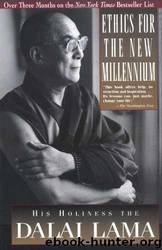Ethics for the New Millennium by Dalai Lama

Author:Dalai Lama
Language: eng
Format: azw3
Tags: Body, Ethics & Moral Philosophy, Eschatology, Spirituality, Philosophy, Inspiration & Personal Growth, General, Religion, Buddhism, Self-Help, Mind & Spirit, Ethics, Tibetan, Personal Growth, Happiness
ISBN: 9781573228831
Publisher: Riverhead Trade
Published: 2001-05-01T04:31:12+00:00
Chapter Eight
THE ETHIC OF COMPASSION
WE NOTED EARLIER THAT ALL THE WORLD’S major religions stress the importance of cultivating love and compassion. In the Buddhist philosophical tradition, different levels of attainment are described. At a basic level, compassion (nying je) is understood mainly in terms of empathy—our ability to enter into and, to some extent, share others’ suffering. But Buddhists—and perhaps others—believe that this can be developed to such a degree that not only does our compassion arise without any effort, but it is unconditional, undifferentiated, and universal in scope. A feeling of intimacy toward all other sentient beings, including of course those who would harm us, is generated, which is likened in the literature to the love a mother has for her only child.
But this sense of equanimity toward all others is not seen as an end in itself. Rather, it is seen as the springboard to a love still greater. Because our capacity for empathy is innate, and because the ability to reason is also an innate faculty, compassion shares the characteristics of consciousness itself. The potential we have to develop it is therefore stable and continuous. It is not a resource which can be used up—as water is used up when we boil it. And though it can be described in terms of activity, it is not like a physical activity which we train for, like jumping, where once we reach a certain height we can go no further. On the contrary, when we enhance our sensitivity toward others’ suffering through deliberately opening ourselves up to it, it is believed that we can gradually extend out compassion to the point where the individual feels so moved by even the subtlest suffering of others that they come to have an overwhelming sense of responsibility toward those others. This causes the one who is compassionate to dedicate themselves entirely to helping others overcome both their suffering and the causes of their suffering. In Tibetan, this ultimate level of attainment is called nying je chenmo, literally “great compassion.”
Now I am not suggesting that each individual must attain these advanced states of spiritual development in order to lead an ethically wholesome life. I have described nying je chenmo not because it is a precondition of ethical conduct but rather because I believe that pushing the logic of compassion to the highest level can act as a powerful inspiration. If we can just keep the aspiration to develop nying je chenmo, or great compassion, as an ideal, it will naturally have a significant impact on our outlook. Based on the simple recognition that, just as I do, so do all others desire to be happy and not to suffer, it will serve as a constant reminder against selfishness and partiality. It will remind us that if we reserve ethical conduct for those whom we feel close to, the danger is that we will neglect our responsibilities toward those outside this circle. It will remind us that there is little to be gained from being kind and generous because we hope to win something in return.
Download
This site does not store any files on its server. We only index and link to content provided by other sites. Please contact the content providers to delete copyright contents if any and email us, we'll remove relevant links or contents immediately.
The Way of Zen by Alan W. Watts(6600)
Ego Is the Enemy by Ryan Holiday(5413)
The Art of Happiness by The Dalai Lama(4125)
The Book of Joy by Dalai Lama(3974)
Why Buddhism is True by Robert Wright(3446)
Spark Joy by Marie Kondo(3298)
Shift into Freedom by Loch Kelly(3193)
Happiness by Matthieu Ricard(3040)
A Monk's Guide to a Clean House and Mind by Shoukei Matsumoto(2902)
The Lost Art of Good Conversation by Sakyong Mipham(2649)
The Meaning of the Library by unknow(2564)
The Unfettered Mind: Writings from a Zen Master to a Master Swordsman by Takuan Soho(2304)
The Third Eye by T. Lobsang Rampa(2257)
Anthology by T J(2206)
Red Shambhala by Andrei Znamenski(2193)
The Diamond Cutter by Geshe Michael Roach(2058)
Thoughts Without A Thinker: Psychotherapy from a Buddhist Perspective by Epstein Mark(2011)
Twilight of Idols and Anti-Christ by Friedrich Nietzsche(1891)
Advice Not Given by Mark Epstein(1878)
